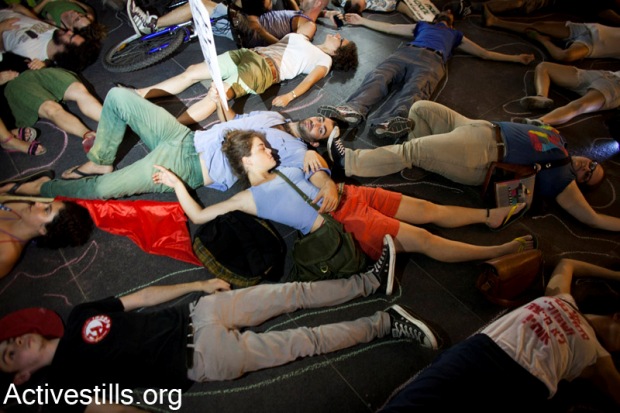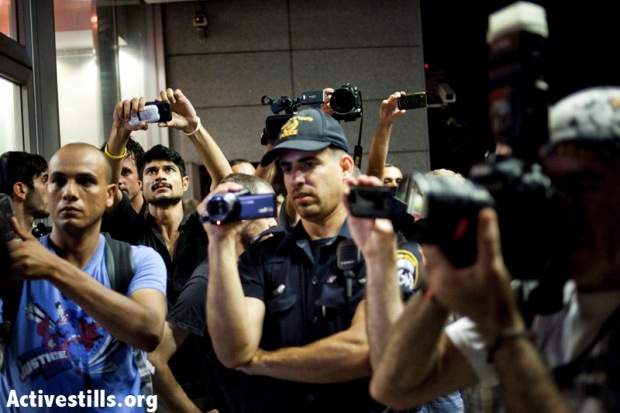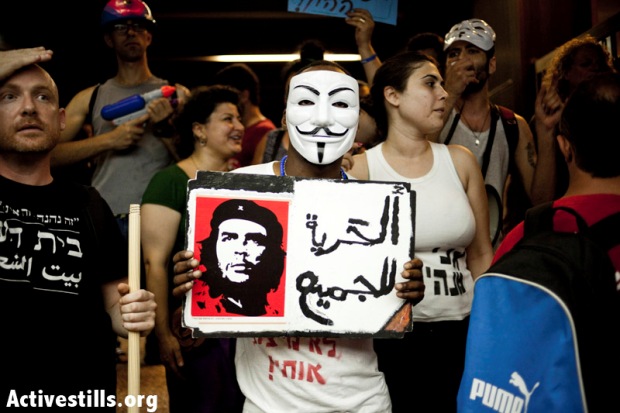Two parallel demonstrations took place on Saturday night in the fair city of Tel Aviv: one calling for equal duties, the other for equal rights, and both defining themselves as part of J14. Why the split, and where is it going?
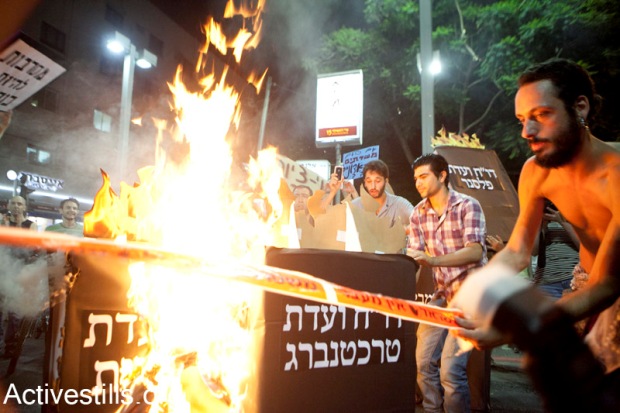
Itzik Shmuli, leader of the national student union, did not join any of the recent weeks’ J14 demonstrations for social justice. This aspiring politician, dubbed by media last year as the “responsible adult” in the movement, even went to the trouble of telling off demonstrators after a few bank windows were shattered during a vibrant demonstration two weeks ago, and chose not to partake even in the more moderate of the two demonstrations that took place in Tel Aviv last Saturday.
Last night, however, he chose to return to the streets, alongside several other more mainstream J14 activists, ex-military men, several ministers and MKs, and a group of right wing groups such as Im Tirzu. The cause, dubbed by some a “natural part of J14,” was to fight for the mandatory military enlistment of all citizens, ultra-Orthodox and Arabs alike. Tens of thousands rallied at the museum square in central Tel Aviv and demanded that the government force Israelis to “share the burden equally,” and to take away social benefits from those who don’t.
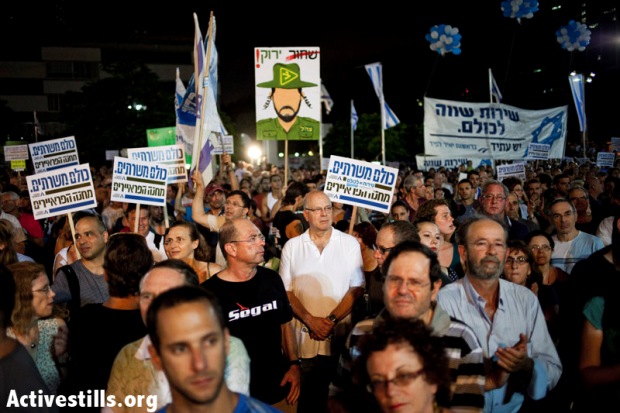
As speakers were going on and off the stage, about 1,000 other J14 protestors marched the streets of Tel Aviv, blocking main roads, attaching anti-foreclosure posters to banks, and setting fire to government bills and reports printed on cardboard.
For more on the draft issue from +972:
>Palestinian citizens cannot be expected to serve Jewish state / by Fady Khoury
>Debate on draft reform moves Israel further away from democracy / by Noam Sheizaf
As opposed to the main rally at the museum, this demonstration was organized within about 24 hours, and got none of the media support that the rally did. (Three of the big national papers – Yedioth Ahronoth, Ma’ariv and Israel Hayom – showed clear sympathy for the pro-draft rally in their Friday editions, and the two former published calls to join it.)
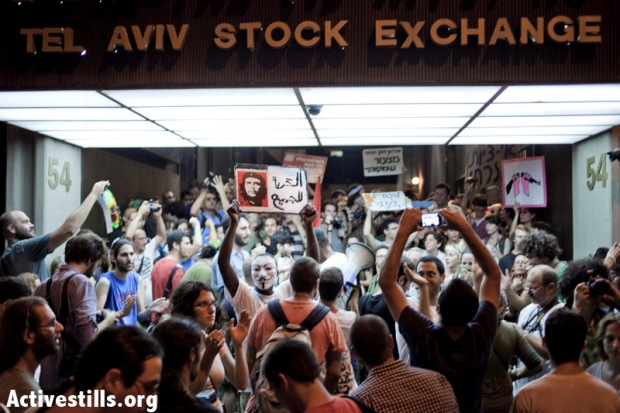
Also in contrast to the rally, this demonstration was about equal rights, not equal duties. Slogans chanted were aimed at capitalism, the banks and the government, and at parts also at the army and entire Israeli security apparatus – especially as demonstrators passed by the Ministry of Defense. The military “Racoon” surveillance vehicle made a second appearance and photographed everyone at the demonstration. Dozens of undercover police were spotted in the demonstration, but unlike two weeks ago – police allowed the uncoordinated march, and no arrests were made.
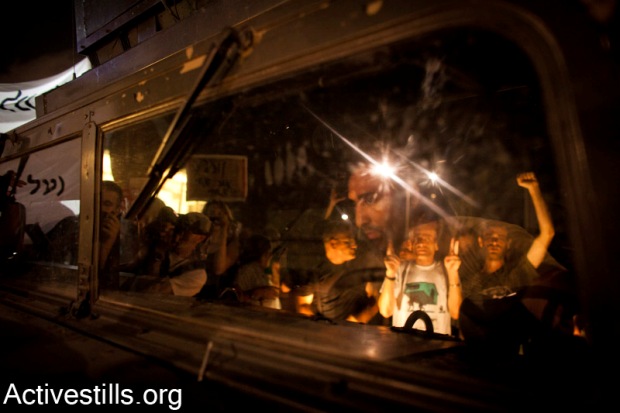
The breakdown of the Zionist contract
So why two demonstrations? Why the split in J14? One has to look into the history of Zionism and the State to understand this one. The founding social contract of Zionism was based on the notion that all Jews must stick together, especially in combat against Arabs but also otherwise against a hostile world, and in exchange they would enjoy the benefits of a welfare state. Of course this was never actually the case, as men and women were never equal in the army and thus neither in civilian life, and Ashkenazi and Mizrahi Jews were also treated differently, the latter being constantly discriminated against – but the hegemonic ethos survived. That is, until the 1980s.
When the neo-liberal economy started taking hold of Israel, the Zionist contact started to lose ground. Privatization and cuts in health, housing, education and healthcare took their toll on society; the army started losing its near-sacred status; upper-class individuals realized they no longer needed the army to maintain their position in the economy; and the lower classes could afford less and less to lose two to three years of paid work. By no coincidence, this period between 1990 and 2010 was also when the number of ultra-Orthodox Jews avoiding the draft took an immense leap upwards.
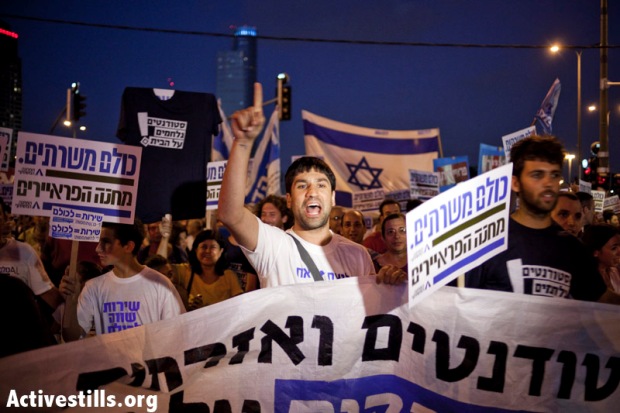
The entire J14 movement, I believe, is a late repercussion of neo-liberalism’s breaking of the Zionist contract. Stemming from the middle class disappointment at having kept its side of the deal only for the state to neglect its part, people took to the streets. What they found in the streets, however, was much more complex. Uniting for the first time in local mainstream history with the periphery of Mizrahi Jews and with some Palestinians with Israeli citizenship – many in the Ashkenazi middle class suddenly realized that the old contract wasn’t as good for many as it had been for them.
This is were the friction comes in: while some have responded to this discovery by taking a step back, stating they only wish to reclaim the old “welfare state” and prove their loyalty to the patria with outspoken militarism, others take a step forward, reject the ancient contract, and take from it only the notion of solidarity – which is now finally being enhanced and widened to include all citizens.
It is no coincidence that the government and most of the media is treating the former J14ers, who find it easier to unite with right-wing groups like they did yesterday, with respect. The latter, comprised of left wingers who try to expand solidarity even further to include Palestinians in the occupied territories as well, are branded as “anarchists” or “criminals,” tailed by a military vehicle, harrassed by police – with the media either ignoring or criticizing them.
Yet this is all, I wish to argue, a blessed part of J14. It is a struggle within the struggle, a fight for a new sort of discourse, and an ongoing process in which people on the streets and on the social networks are constantly learning and redefining themselves. It is the most basic and necessary thing in a democracy and it is something that was impossible to imagine in Israeli society of old – until the first tent sprung up on July 14, 2011. It is unclear where it is all going, but it is fascinating.
Read also:
J14 two weeks ago: WATCH: Thousands block highway, attack banks in J14 protest
J14 last week: Thousands march in Tel Aviv; J14 protesters block J’lem light rail
Noam Sheizaf contributed to this report


